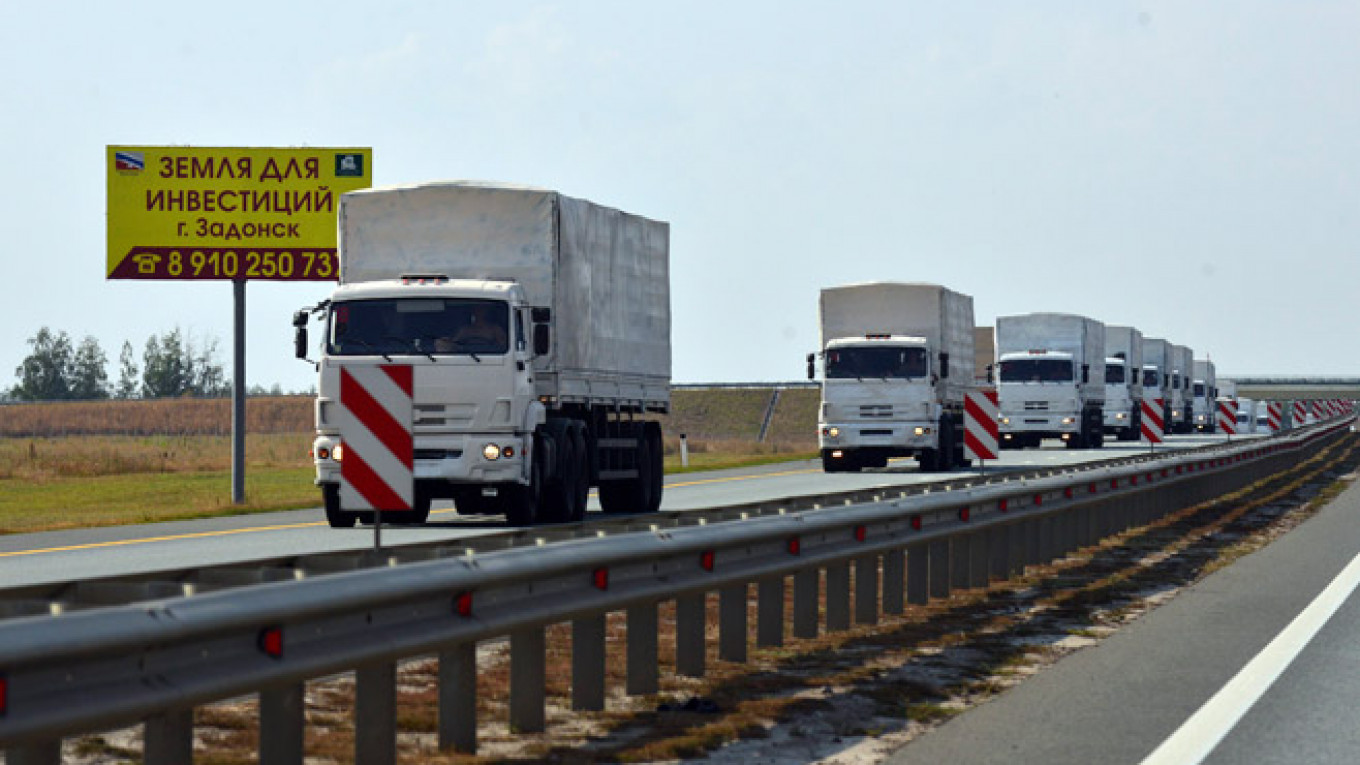Ukraine denounced the dispatch of a Russian humanitarian aid convoy to eastern Ukraine as an act of cynicism on Wednesday and said it would not be allowed in.
The comments reflected suspicions in Kiev and Western capitals that passage of the convoy onto Ukrainian soil could turn into a covert military action to help separatists now losing ground to government forces.
"The level of Russian cynicism knows no bounds," Prime Minister Arseny Yatsenyuk said at a government meeting. "First they send tanks, Grad missiles and bandits who fire on Ukrainians and then they send water and salt."
Interior Minister Arsen Avakov said on his Facebook page: "No Putin 'humanitarian convoy' will be allowed across the territory of Kharkiv region. The provocation by a cynical aggressor will not be allowed on our territory."
Yatsenyuk reiterated that any kind of humanitarian aid from the outside had to be organized under the auspices of the International Committee of the Red Cross.
It was not immediately clear if this was an outright rejection of the Russian aid, which was being taken by a convoy of 280 trucks down to the Ukrainian border on Wednesday, or a refusal to allow the Russian trucks onto Ukrainian territory.
Humanitarian Crisis
Ukraine said on Tuesday that the cargo would have to be unloaded from Russian trucks at the border and transferred under international Red Cross aegis onto other vehicles. The European Union (EU) said the contents would have to be scrutinized.
Kiev accuses Russia of supporting and arming the rebels — who now appear to be on the verge of defeat by government forces — with tanks, missiles and other weapons. Moscow denies this.
Four months of fighting in the east has produced a humanitarian crisis in parts of eastern Ukraine. People in the main cities of Donetsk and Luhansk, on the border with Russia, are suffering acute shortages of water, food and electricity.
Yatsenyuk said the Kiev government had received $6 million from its Western partners which would be used to alleviate conditions in distressed areas.
"We as the government of Ukraine are sending vitally needed goods to all the liberated territories," Yatsenyuk said, meaning those places which had been recaptured from the rebels.
"We as a state are looking after and are capable of looking after our citizens," he said.
The convoy which Russia says is carrying about 2,000 tons of water, baby foods and other goods left the Moscow region on Tuesday for the Ukrainian border.
Journalists monitoring the movement of the convoy said it appeared to be at the Russian town of Voronezh on Wednesday, about 340 kilometers from Shebekino on the Ukrainian border.
A Message from The Moscow Times:
Dear readers,
We are facing unprecedented challenges. Russia's Prosecutor General's Office has designated The Moscow Times as an "undesirable" organization, criminalizing our work and putting our staff at risk of prosecution. This follows our earlier unjust labeling as a "foreign agent."
These actions are direct attempts to silence independent journalism in Russia. The authorities claim our work "discredits the decisions of the Russian leadership." We see things differently: we strive to provide accurate, unbiased reporting on Russia.
We, the journalists of The Moscow Times, refuse to be silenced. But to continue our work, we need your help.
Your support, no matter how small, makes a world of difference. If you can, please support us monthly starting from just $2. It's quick to set up, and every contribution makes a significant impact.
By supporting The Moscow Times, you're defending open, independent journalism in the face of repression. Thank you for standing with us.
Remind me later.






